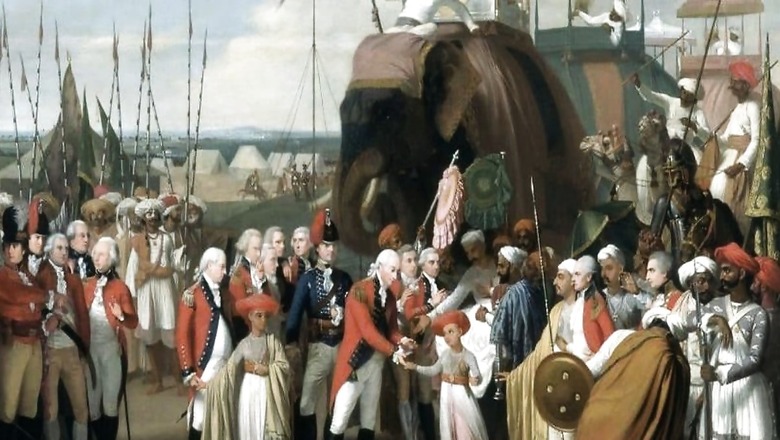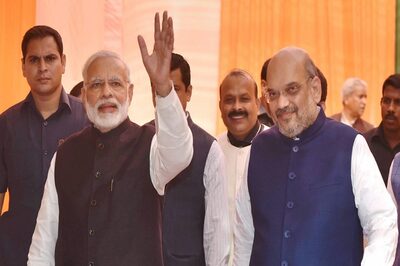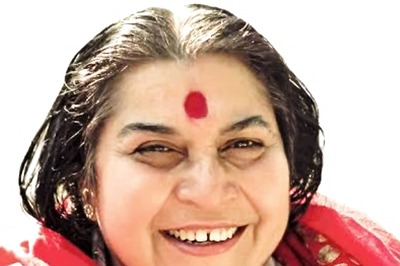
views
It is not very often that an Indian politician says nice words about the British conquest of India and the Raj. This makes the comments by the Bharatiya Janata Party’s Krishnagar (West Bengal) Lok Sabha candidate ‘Rajmata’ Amrita Roy conspicuous. While she was trying to defend her ancestor’s action during the Battle of Plassey in 1757, the upshot was also the condonation of British rule.
Roy asserted that Krishnachandra Roy, a feudal lord, sided with the British during the Battle of Plassey because Nawab Siraj-ud-Daulah was a tyrant. “The allegation is Maharaja Krishnachandra Roy had sided with the British. The question is why did he do that? It’s because of the tyranny of Siraj ud-Daulah. If Maharaja Krishnachandra Roy had not done that, Hinduism and the Bengali language would not have survived in Bengal,” Amrita Roy said, adding, “The Sanatan Dharma was under threat because of Siraj ud-Daulah’s tyranny. Maharaja Krishnachandra Roy saved Bengal and Hinduism.”
While politicians and intellectuals are busy analysing the veracity of her claims, the point that needs to be emphasised here is that perhaps for the first time, a BJP leader is of the view that British rule had some beneficial aspect. This is important against the backdrop of a shrill decolonisation drive by the ruling dispensation and a shriller campaign by the Left-liberal intellectual class to blame everything bad on the West.
While the Narendra Modi government removes some symbols of ‘colonial legacy’ or others all the time, its ideological and political opponents behave no differently on this issue. Shashi Tharoor’s ‘An Era of Darkness: The British Empire in India’ indulges in a most reprehensible exercise of lie-peddling: it blames the British for, among other things, promoting the caste system, asserting that the Raj exacerbated the worst features of caste. In the words of Tharoor, “the caste system became more rigid under the British than it had been in pre-colonial India” (Page 113). To buttress his case, he cited ‘postcolonial’ scholars who infest the academic world.
This is not to say that the British did nothing wrong in India; their economic policy cost us a great deal; racial arrogance is widely documented; and there were atrocities, the worst being the Jallianwala Bagh massacre (1919). Yet, the Raj was not an unmixed evil. The India that we and the world know today was made by the British. It is grudgingly accepted by everyone that the British did build institutions: civil service, police service, a standing army, modern judiciary and justice system, rudiments of democracy, representative government, the central bank, the Comptroller & Auditor General, a good and inclusive education system, Railways, etc. But these are often dismissed as the instruments to produce lowly-paid clerks, further imperial designs, and perpetuate exploitation.
Our textbooks teach us how conceited, selfish, and exploitative the British imperialists were. Thomas Macaulay’s famous statement is especially mentioned: “We must at present do our best to form a class who may be interpreters between us and the millions whom we govern; a class of persons, Indian in blood and colour, but English in taste, in opinions, in morals, and in intellect.”
The quote seems to expose the nefarious plot of creating, in the communist lingo, ‘a comprador class,’ the quislings and Jaichands who kowtowed to their imperial masters. Hindu nationalists also hate this class; they have even coined terms like Macaulay-putra and Macaulay-putri.
But neither jingoistic and doctrinal miasma nor semantic innovations can alter the fact that Macaulay was among those Britons who prepared the template of modern India. It was the education system he conceived that is predominant not just in India but also in Pakistan and Bangladesh. The political, literary, and scientific elites—indeed the entire intelligentsia—of the three countries are steeped in the Macaulayan system.
Ditto with our justice system. Almost single-handedly, Macaulay created the Indian Penal Code over a century and a half ago. In Pakistan, it became, section by section, the Pakistan Penal Code and in Bangladesh the Bangladesh Penal Code. Of course, it was not perfect; the sedition section was an example, as also was the one on adultery (now abrogated). But the fact that the substantive part of the penal code has been accepted by three nations following different faiths is a testimony to the fact that the great imperialist had the perspicacity to delineate laws which were in consonance with the local requirements and the modern imperative, the imperative that a lot of Indians embraced.
If democracy has survived in India for so long, it is because of the institutions that the Raj built and nurtured; British rule also birthed modern literature and free press which continue to strengthen democracy.
Most importantly, the British brought enlightenment ideas to the Indian shores, though this was mostly involuntary. They came here for profits; witnessing a political vacuum during the decline of the Mughal Empire, they became politically ambitious; thanks to their superior organisation, they ended up ruling the country. The upshot, at any rate, was that they sowed the seeds of modernity in India.
Therefore, the vitriolic hatred for British rule can only be called irrational, and somewhat racist. Thankfully, there is at least one BJP leader who is not afraid to call the Raj good.
The author is a freelance journalist. Views expressed in the above piece are personal and solely that of the author. They do not necessarily reflect News18’s views.



















Comments
0 comment